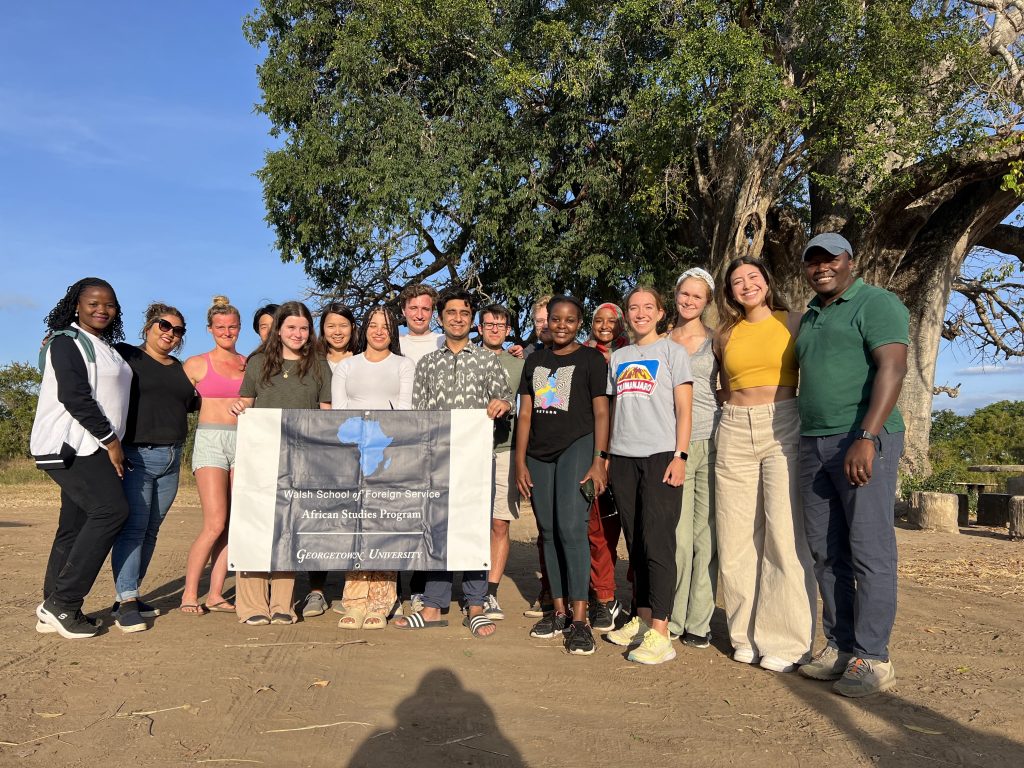Students’ Testimonials
During my five weeks in Dar es Salaam, Tanzania, I lived with a family of five inside their home on the campus of the University of Dar es Salaam.
Upon arrival, my host family was incredibly welcoming and hospitable. I was greeted with hugs and sat down for tea with them after settling in. We enjoyed a delicious Masala Chai as we got to know each other. We learned of each other’s backgrounds and shared the things we had in common. Adjusting to life in Tanzania was a much smoother experience thanks to the homestay. My host family provided us with so many things and made sure that we got everything we needed. I felt incredibly comfortable in their home and they made me feel as if I was part of the family very quickly.
Shared meals with my host family were my favorite part of the day because I enjoyed all the new Swahili dishes I was trying. Being able to live with a host family was also very rewarding because I was able to review all the new words and concepts I learned during Swahili class with my family. We always went over what we learned in class and they were gracious enough to practice with me daily. This made studying an easy and fun experience that I looked forward to every day.
Bonding with my host siblings was also very exciting. We played soccer and introduced each other to different card games that we played after dinner. By the end of the homestay, we had grown very close and I was very sad to say goodbye to my new family, though my host mother and I remain in touch via Whatsapp. I hope to one day return and visit them soon!
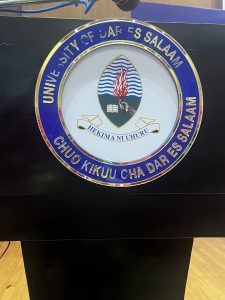
As part of Georgetown’s program in Dar es Salaam, Tanzania, I spent five weeks as a program intern at ICCAO (Integrating Capacity and Community Advancement Organization), a youth-led, youth-serving organization that works to increase youth participation in civic and development activities. Through my study abroad and internship experience, I learned that being a leader requires asking people what they want instead of telling them what they need. In the field of international development, there is too often an ethos that the right answers to conomic development reside in the West. After all, these development economists argue, the United States is the richest country on Earth. However, what works in one country, cultural context, and time period may not work in another. Most crucially, Tanzanians do not strive to be the United States — they simply want to be a healthier and more prosperous version of Tanzania.
At ICCAO, I worked on a program that supports girls’ education in rural Tanzania through providing female students with school supplies and mentorship. However, ICCAO noticed a problem: some girls were still unable to go to school because the school was so far from their homes that the walk to school consumed too much of their day. ICCAO’s leadership thought the solution to this problem was to build a dormitory so some girls could “board” at school. However, this project was externally funded and the funds could only go to school supplies. In this way, the hubris of the western development system ensured that money continued to be channeled to buy school supplies for students that could not attend school in the first place. This cycle of ignorance and ineffectiveness can be broken when development organizations listen to their local partners. For example, one of ICCAO’s initiatives is a livelihood training program for young out-of-school mothers with bi-weekly meetings. While I was at ICCAO, the number of women showing up to the sessions was rapidly depleting. ICCAO asked the women why they were not coming and they told them they could not afford the transportation costs to come to the office. However, ICCAO’s funders required that they empower participants, rather than directly paying them. Meanwhile, these people could not reach the office in the first place without such initial cash. To remedy this gap, ICCAO decided to give the women not money but jewelry, encouraging them to sell it during the week to raise money for transportation. In this sense, by listening and working with a local community, ICCAO was able to empower them to be financially independent.
This example reinforces the importance of thinking outside the box, rejecting traditionally western development orthodoxy and instead co-creating programming directly with community members to allow their lived experiences to inform culturally sensitive and locally relevant development work. Orthodoxy can only lead so far. What Tanzania needs is not more programs from the United States, but more programs by and for Tanzanians. ICCAO, in its youth-led, youth-serving approach, is doing just that. It is a lesson to me that leadership requires listening to and empowering local communities, rather than speaking for them.
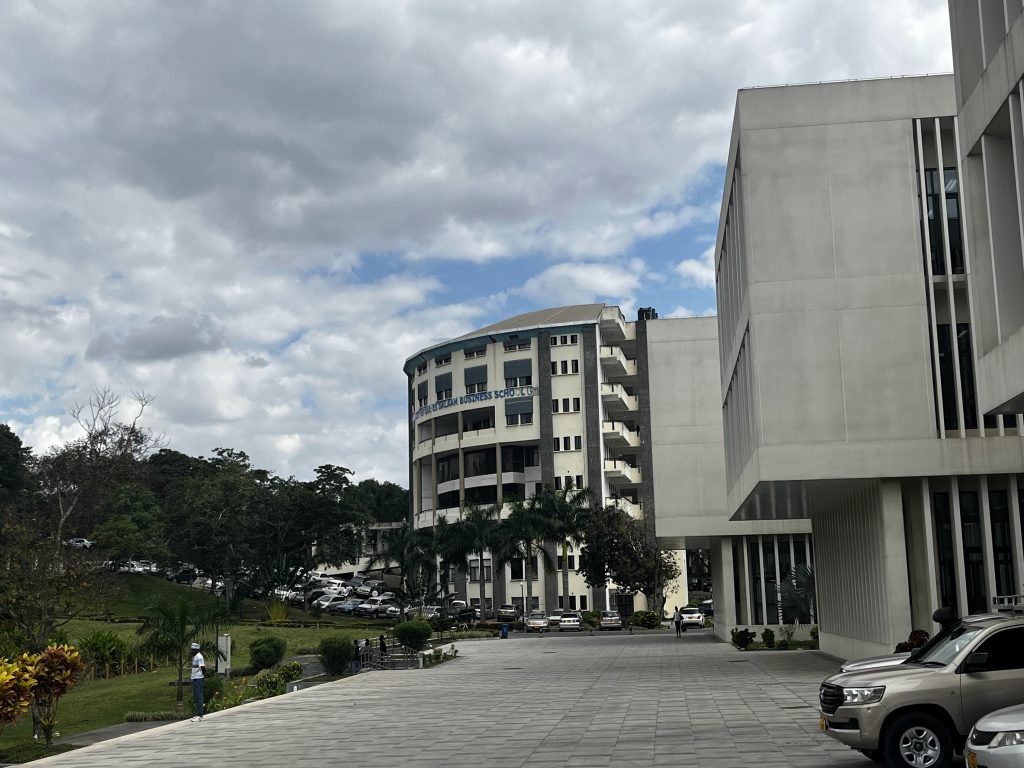
When I think back on my summer, I think of five weeks full of new experiences, learning, exploration, and friendship. I spent five weeks this summer in Dar es Salaam, Tanzania
with the Georgetown African Studies Program as a participant of their Development Challenges in Tanzania summer study abroad program. Each day, we woke up bright and early at 6:30am, ate a quick breakfast, and walked
about 20 minutes on the beautiful University of Dar es Salaam campus to get to our 8:00am Swahili class. There, we met our wonderful professors and spent two hours each morning working on developing our Swahili language skills and learning more about aspects of Swahili culture. After class, the fifteen of us split up into two vans, driven by our wonderful drivers Amani and Steven, and went to our internships.
We spent every weekday from 10:00am to 4:00pm at our internships and subsequently got to know our coworkers and the work that the organization was doing very well. I interned at a local non-governmental organization in Dar es Salaam called Hope 4 Young Girls. Hope 4 Young Girls runs educational programs at schools throughout Tanzania educating young girls on critically important topics such as reproductive health and the rights that they have as members of society. Our coworkers were invested and passionate about their work. Every day, they were at work before us and we left for the day before them. The founder of Hope 4 Young Girls, Salama Kikudo, has remained the head of the organization since she founded it, and is clearly deeply invested in its mission and goals.
As interns for Hope 4 Young Girls, we had a few specific responsibilities that allowed us to help the company’s ongoing initiatives and growth as an organization. We worked on aspects of their educational initiatives such as creating lesson plans for schools that focused on menstrual hygiene. We created a LinkedIn profile for Hope 4 Young Girls and worked with them to develop a broader and more cohesive social media presence through using graphic design
templates and deciding on a color palette for them to use to tie their social media together. We also broadened their fundraising database and researched and applied for many grants that were applicable to their status as a non-profit organization. While working on grant research, I noticed interesting patterns, such as the lack of many grants supporting grassroots organizations or women-led non-governmental organizations that illustrated why it was hard for organizations like ours to succeed in the long-run.
After each day of work, I left to go back to my host family feeling like I had accomplished something. Working as an intern for Hope 4 Young Girls was rewarding through the fact that the work we were doing was directly helping our hard-working organization. I learned so much about non-governmental organizations, grant writing, and social media communications during my time at Hope 4 Young Girls and I will forever be grateful for the experience and my wonderful coworkers. Asante sana, Hope 4 Young Girls.
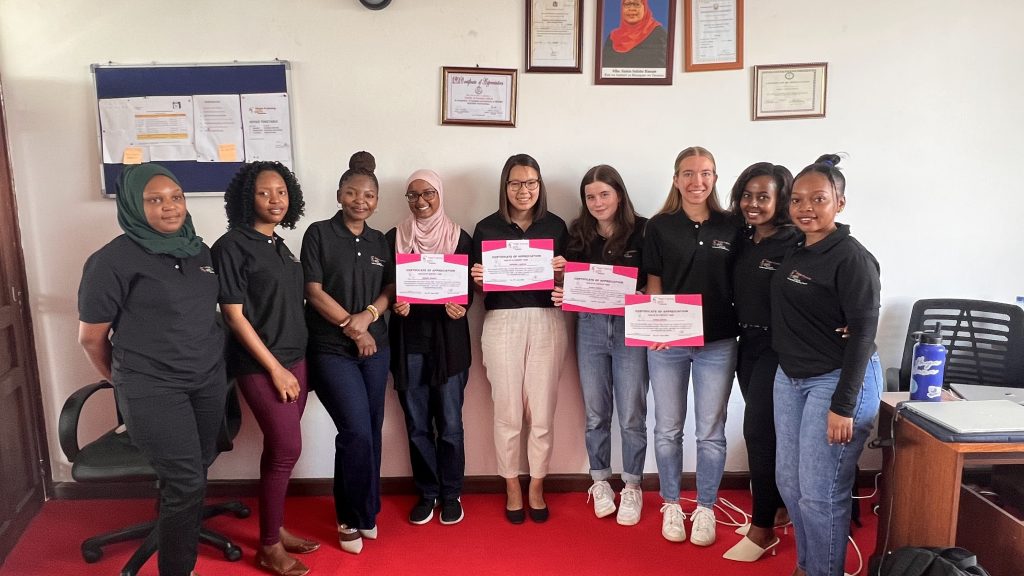
Beyond the Metrics: An Alternative Approach to Educational Development
On the outskirts of Dar es Salaam in the Goba municipality, Bright Jamii Initiative sits as a pioneer in educational development. When academics and international NGOs discuss positive educational outcomes, they speak in terms of mean years of schooling, teacher-pupil ratio, and enrollment/attendance rates. The impact of education on income, health, and economic growth at-large are well documented in development economics, but for countless practitioners in the development community, the story stops there. The Bright Jamii Initiative (BJI), lead but its founder Irene Fugara, sees educational attainment as merely one piece of a holistic education. As the above statistics continue to trend positively, the social-emotional skills of youth in Tanzania are stagnant if not decreasing. Tanzanian schools (both public and private) remain rife with corporal punishment, abuse, and harassment. This is the jumping off point for BJI’s work.
In our first week at BJI, the team immediately immersed us in a wealth of literature on social-emotional learning and its application to the Tanzanian context. At the beginning of every week, we selected a virtue that would guide our work for that week. Moreover, each day concluded with open discussions about complex issues; we discussed the stigma around female reproductive health in Tanzania, compared the dynamic between boys and girls in Tanzanian versus American schools, and explored the impact of the emotional suppression of youth on Tanzanian culture today. Bright Jamii’s practices highlight a core tenant of development work: positionality and intentions matter. Having open discussions about the issues they are tackling and approaching them with specific virtues in mind always ensures their work is well-intentioned.
Moving to the work of BJI itself, their goal is simple but much needed. Tanzanian students learn in an atmosphere where, in order to be successful, you need to study hard, keep your head down, and submit to authority. In SEL surveys carried out in Tanzania, few survey respondents identified confidence and creativity as core emotions they either possessed or believed were important for school children. As interns at BJI we were able to explore the areas that suited and interests the most. In my case, I was able to support a number of their projects, two of which being SEL curriculum design and impact evaluation. On impact evaluation, BJI conducted several pre and post assessments for the classes they taught, all collected on paper. Using Power BI, I was able to show them how to create and maintain databases and generate graphs. Regarding curriculum design, in an effort to provide their services to public schools free of charge, BJI routinely holds camps for children where they cover the emotional skills training absent in their schools. BJI in recent years has also expanded its training to teachers themselves, recognizing that harsh and abusive punishments are often the result of lack of social-emotional skills too. Well designed SEL curriculum can provide strong economic and social returns related to productivity, increase in opportunity, and improvements in public health. BJI is a frontrunner in Tanzanian educational development that is willing to look beyond the hollow growth metrics and use their grassroots knowledge and connections to implement meaningful change for students across Dar es Salaam.
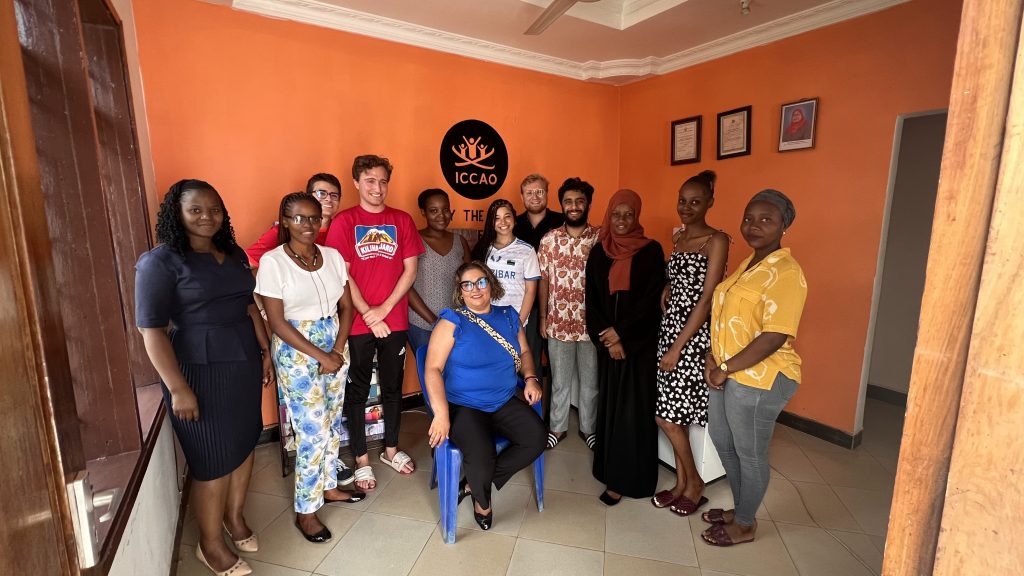
My journey to Tanzania as a participant in the Development Challenges in Tanzania summer program was nothing short of transformative. This unique opportunity allowed me to explore the intersection of language, culture, and development through learning the Kiswahili language, volunteering at two local non-profits, and in-depth studies of Tanzania’s development post-colonial era. One of the highlights of the program was the Kiswahili- language course, which was a fundamental component of our cultural immersion experience. The Swahili course was intensive and practical, providing me with a solid foundation in the language. Learning Kiswahili opened doors to authentic interactions with local communities and enriched my understanding of Tanzania’s rich culture. It also allowed me to engage with Tanzanian people on a deeper level, breaking down communication barriers and fostering genuine connections. Whether bargainingat local markets, conversing with my host family, or collaborating with my colleagues at the Bright-Jamii Initiative and International Centre for Cultural Orientation (ICCAO), where I
interned.
Complementing my language studies was the Development course that delved into Tanzania’s complex challenges and the broader global context. The Development class not only served as a channel for deepening my knowledge but also broadened my perspective on the intricacies of development economics, policies, and practices within the post-colonial context of Tanzania, with a particular emphasis on the UJAMAA period. The UJAMMA period in 1960s-70s Tanzania, under President Julius Nyerere, aimed to reduce inequality through communal ownership and Ujamaa villages, but faced economic challenges. Today, Tanzania emphasizes equity and social justice in its development approach, despite shifting towards market-oriented policies. As part of the program, I had the privilege of interning with two non-profit organizations; Bright-Jammi Initiative; an organization that aims at creating a society where the welfare of a child is a priority by providing social-emotional learning and character development courses to students, teachers and, parents. Well as Integrating Capacity and Community Advancement Organization (ICCAO), a youth-led organization is dedicated to instilling adolescent girls and young with the necessary skills to solve challenges in their lives and communities at large. Working closely with these two non-profits, I gained insight into the nuanced issues facingTanzanian communities and witnessed the impact of grassroots initiatives in addressing these challenges.
Furthermore, my research proposal, focused on assessing the impact of input subsidies on agricultural productivity and commercialization in Tanzania, represents the pinnacle of my academic pursuits. This endeavor aimed to explore the complex array of factors shaping agricultural productivity within Tanzania. Throughout this journey, I acquired a deep understanding of the critical roles played by government policies, market dynamics, and the
unique challenges encountered by smallholder farmers. While the research proposal itself did not yield findings, it provided the groundwork for a comprehensive investigation into these factors. The proposal underscores the significance of crafting well-informed agricultural interventions tailored to the diverse needs of farmers and promoting sustainable agricultural practices, setting the stage for a rigorous study that can contribute valuable insights to the field.
